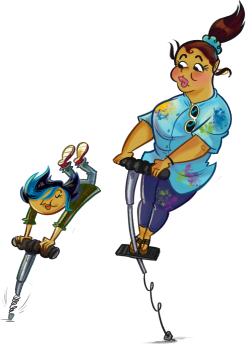If you’re starting med school–Congrats! It’s an exciting time. Aaaand… stressful. Moving to a new city, finding the best cycle bar, meeting new peers, tracking down that perfectly sized TV stand on Marketplace... Oh and then there’s the studying… and studying… and a bit more studying! Did we mention stress?
Of course, you knew this was part of the deal. The thing is—not only is there a lot to study, but med school moves fast! Or tachy, as they say. Being in a new environment and with so much new information coming your way, you might be wondering how to study in medical school in the first place. Well, starting off on the right foot can make a world of difference!
We certainly know these struggles firsthand at Sketchy. So, we’ve compiled a few study habits to help you along the way!
Effective Time Management
 First, before learning how to study in medical school, finish watching the second season of that new series. Just don’t start the third. Don’t start it. DO NOT start it. Okay maybe the first five minutes of the first episode. Or just the first episode… or two. We’re kidding, only kidding of course, but it’s no joke that effective time management is critical to success in medical school.
First, before learning how to study in medical school, finish watching the second season of that new series. Just don’t start the third. Don’t start it. DO NOT start it. Okay maybe the first five minutes of the first episode. Or just the first episode… or two. We’re kidding, only kidding of course, but it’s no joke that effective time management is critical to success in medical school.
In medical school, you’re going to be pulled in a lot of different directions, and knowing how to prioritize your time, goals, and personal interests can be difficult. But in the end when you’ve achieved the test scores you wanted and matched into the residency program of your dreams, it will all be worth it.
Study Forward, Not Backward.
Don’t wait until after the lecture or for that end of the week study group to give the topic a once over! Studying forward means planning ahead and managing your time effectively (did you read tip #1?!) And, not to toot our own horn, but Sketchy can be a great resource for this approach! Have a cranial lecture coming up this week? Tune into Sketchy’s cranial nerve videos the night before. We recommend reviewing content before the lecture, then writing down questions you have so that you can go into the lecture with background on the subject instead of having to catch up afterward. Hey, you might even learn a thing or two about Norse mythology–you know, for weekend trivia night.
Another added benefit here is that by studying forward, you’ll also have more time to experiment with different study resources and strategies. If one approach isn’t working, try something else. Find what works best for you. What works for a classmate might not be your cup of tea, and the path to medical school success is not one-size-fits-all!
Identify Step 1 study materials, integrate them into your studies - Early!
 How to study in medical school is not rocket science (it’s medical science) but it does require some planning. A huge part of success in medical school will be determined by your performance on standardized exams such as the Shelf Exams and USMLE (or COMLEX) exams. We suggest identifying well-regarded Step 1 study materials, like Sketchy, and integrating them into your studies early in med school. Remember, it’s easier to go back and review, rather than getting behind and struggling to catch up. Integrating Step 1 resources into your regular medical school study routine will make dedicated study time a lot more painless when the time rolls around.
How to study in medical school is not rocket science (it’s medical science) but it does require some planning. A huge part of success in medical school will be determined by your performance on standardized exams such as the Shelf Exams and USMLE (or COMLEX) exams. We suggest identifying well-regarded Step 1 study materials, like Sketchy, and integrating them into your studies early in med school. Remember, it’s easier to go back and review, rather than getting behind and struggling to catch up. Integrating Step 1 resources into your regular medical school study routine will make dedicated study time a lot more painless when the time rolls around.
Don't wait to get help.
Inevitably, certain topics will prove more challenging than others. Maybe you majored in physics but micro is a grind. Or you know cell bio but could use a boost in anatomy. The important thing is—don’t wait to get help. Many schools have a mentoring program or tutors available at no cost. Maybe you just need a few sessions to prep for a specific unit, or maybe you find that regular meetings are the way to go. For many, knowing how to study in medical school can boil down to knowing how to seek this help early and as often as needed!
And, as an MS2, consider becoming a tutor yourself—it’s a great way to pay it forward and also study for Step 1.
Study Active!
 Speaking of studying (did we mention studying?), study active. We don’t mean speed reading while speed walking—though, hey, maybe there’s something there… Anyway, after you learn a concept from a lecture or textbook, draw out the pathways or steps or structures from memory. Make a flowchart. How do all the details connect to the big picture? Quiz yourself—you can even check out Sketchy’s QBank. There is extensive research about the way active learning helps you to study effectively in medical school, so this is certainly a tip not to be ignored!
Speaking of studying (did we mention studying?), study active. We don’t mean speed reading while speed walking—though, hey, maybe there’s something there… Anyway, after you learn a concept from a lecture or textbook, draw out the pathways or steps or structures from memory. Make a flowchart. How do all the details connect to the big picture? Quiz yourself—you can even check out Sketchy’s QBank. There is extensive research about the way active learning helps you to study effectively in medical school, so this is certainly a tip not to be ignored!
Foundation, Foundation, Foundation.
Build that foundation. Having a solid grasp of pathology and pathophys will give subsequent modules a lot more clarity. We know, memorizing foundational medical topics is not everyone’s favorite pastime, but invest the time upfront to save the time down the line. Seriously. You’re going to want to really get these concepts down. Luckily, Sketchy’s here to help make Pathology unforgettable!
Pro tip: If you’re struggling with a concept down the road, revisit the underlying concepts. It will likely help significantly with your understanding.

Location, Location, Location!
Okay, so there’s a lot to study in med school. But how to study in medical school isn’t the only important element. There’s also the where to study in medical school.
Find your study spots. Window or no window? Which nook in the library has a plug-in handy? Do you prefer some ambient noise or extra quiet? Is the WiFi good? Try out a private study room with a white board—we can’t recommend this enough. Feeling good in your space has been proven to help with productivity, and you're going to want to maximize this in medical school.
When you start to feel your attention wandering, and you keep rereading the same paragraph about renal clearance, move to a new study spot. Take frequent stretch breaks, take the stairs, switch chairs.
And on the topic of breaks—
Studying in general is a whole lot better when you break up huge chunks of material into more manageable bites… exactly like we’ve done with Sketchy Medical! Sometimes, it can all feel a bit overwhelming—did we mention stress? But at Sketchy we’ve got loads of key content delivered in short but memorable videos to help ease that burden. Hey, you might even enjoy studying!

